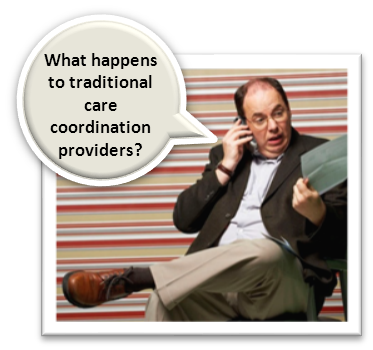Service Coordination
Key Considerations

States provide service coordination in their fee-for-service LTSS programs in a number of ways: by defining it as an HCBS service under section 1915(i), by including it in a section 1915(c) waiver, or by electing targeted case management as an optional state plan service. As you plan your MLTSS program, you will need to decide which of the existing service coordination services are included in the program. In most program models, this means service coordination responsibility shifts to the MLTSS contractor from a traditional service coordination provider.
Depending on your state’s contracting philosophy, you may or may not wish to require formal collaboration between your MLTSS contractors and your traditional service coordination providers. In order to ensure expertise and network adequacy, an MLTSS contractor may seek out provider contracts with traditional service coordination agencies whether or not it is contractually required. But in at least one state, Massachusetts, the Senior Care Options program was designed with an explicit role for traditional service coordination agencies.

